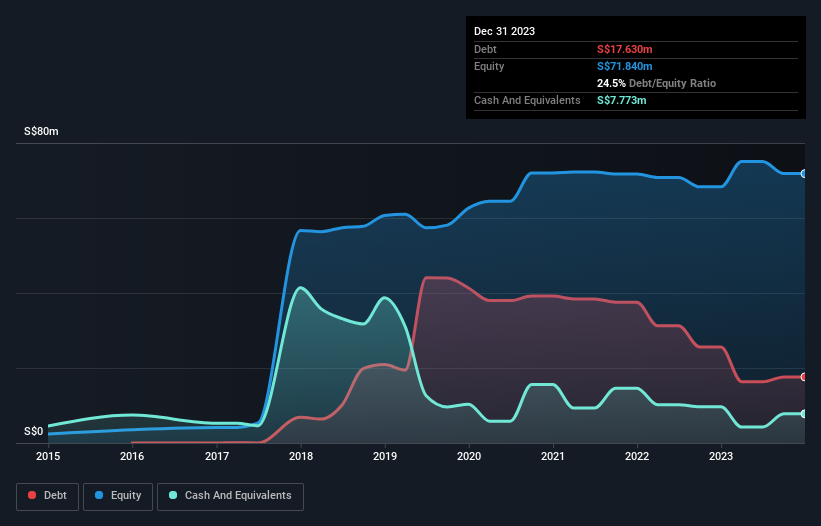- Singapore
- /
- Consumer Services
- /
- SGX:CNE
These 4 Measures Indicate That MindChamps PreSchool (SGX:CNE) Is Using Debt Extensively

David Iben put it well when he said, 'Volatility is not a risk we care about. What we care about is avoiding the permanent loss of capital.' So it might be obvious that you need to consider debt, when you think about how risky any given stock is, because too much debt can sink a company. Importantly, MindChamps PreSchool Limited (SGX:CNE) does carry debt. But is this debt a concern to shareholders?
When Is Debt Dangerous?
Debt and other liabilities become risky for a business when it cannot easily fulfill those obligations, either with free cash flow or by raising capital at an attractive price. If things get really bad, the lenders can take control of the business. While that is not too common, we often do see indebted companies permanently diluting shareholders because lenders force them to raise capital at a distressed price. By replacing dilution, though, debt can be an extremely good tool for businesses that need capital to invest in growth at high rates of return. When we examine debt levels, we first consider both cash and debt levels, together.
View our latest analysis for MindChamps PreSchool
What Is MindChamps PreSchool's Debt?
The image below, which you can click on for greater detail, shows that MindChamps PreSchool had debt of S$17.6m at the end of December 2023, a reduction from S$25.6m over a year. However, it does have S$7.77m in cash offsetting this, leading to net debt of about S$9.86m.

How Strong Is MindChamps PreSchool's Balance Sheet?
We can see from the most recent balance sheet that MindChamps PreSchool had liabilities of S$40.0m falling due within a year, and liabilities of S$27.0m due beyond that. Offsetting these obligations, it had cash of S$7.77m as well as receivables valued at S$18.0m due within 12 months. So its liabilities total S$41.3m more than the combination of its cash and short-term receivables.
When you consider that this deficiency exceeds the company's S$37.6m market capitalization, you might well be inclined to review the balance sheet intently. In the scenario where the company had to clean up its balance sheet quickly, it seems likely shareholders would suffer extensive dilution.
In order to size up a company's debt relative to its earnings, we calculate its net debt divided by its earnings before interest, tax, depreciation, and amortization (EBITDA) and its earnings before interest and tax (EBIT) divided by its interest expense (its interest cover). This way, we consider both the absolute quantum of the debt, as well as the interest rates paid on it.
MindChamps PreSchool has a very low debt to EBITDA ratio of 0.93 so it is strange to see weak interest coverage, with last year's EBIT being only 1.0 times the interest expense. So while we're not necessarily alarmed we think that its debt is far from trivial. Notably, MindChamps PreSchool made a loss at the EBIT level, last year, but improved that to positive EBIT of S$1.9m in the last twelve months. The balance sheet is clearly the area to focus on when you are analysing debt. But you can't view debt in total isolation; since MindChamps PreSchool will need earnings to service that debt. So when considering debt, it's definitely worth looking at the earnings trend. Click here for an interactive snapshot.
But our final consideration is also important, because a company cannot pay debt with paper profits; it needs cold hard cash. So it's worth checking how much of the earnings before interest and tax (EBIT) is backed by free cash flow. Happily for any shareholders, MindChamps PreSchool actually produced more free cash flow than EBIT over the last year. That sort of strong cash generation warms our hearts like a puppy in a bumblebee suit.
Our View
Neither MindChamps PreSchool's ability to cover its interest expense with its EBIT nor its level of total liabilities gave us confidence in its ability to take on more debt. But its conversion of EBIT to free cash flow tells a very different story, and suggests some resilience. Looking at all the angles mentioned above, it does seem to us that MindChamps PreSchool is a somewhat risky investment as a result of its debt. That's not necessarily a bad thing, since leverage can boost returns on equity, but it is something to be aware of. The balance sheet is clearly the area to focus on when you are analysing debt. However, not all investment risk resides within the balance sheet - far from it. These risks can be hard to spot. Every company has them, and we've spotted 4 warning signs for MindChamps PreSchool (of which 1 is potentially serious!) you should know about.
At the end of the day, it's often better to focus on companies that are free from net debt. You can access our special list of such companies (all with a track record of profit growth). It's free.
New: Manage All Your Stock Portfolios in One Place
We've created the ultimate portfolio companion for stock investors, and it's free.
• Connect an unlimited number of Portfolios and see your total in one currency
• Be alerted to new Warning Signs or Risks via email or mobile
• Track the Fair Value of your stocks
Have feedback on this article? Concerned about the content? Get in touch with us directly. Alternatively, email editorial-team (at) simplywallst.com.
This article by Simply Wall St is general in nature. We provide commentary based on historical data and analyst forecasts only using an unbiased methodology and our articles are not intended to be financial advice. It does not constitute a recommendation to buy or sell any stock, and does not take account of your objectives, or your financial situation. We aim to bring you long-term focused analysis driven by fundamental data. Note that our analysis may not factor in the latest price-sensitive company announcements or qualitative material. Simply Wall St has no position in any stocks mentioned.
About SGX:CNE
MindChamps PreSchool
Provides childcare services in Singapore and Australia.
Moderate with mediocre balance sheet.
Similar Companies
Market Insights
Community Narratives




